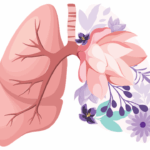
Nature’s Answer for Protection Against Viral Infections
Introduction
As scientists around the globe search for ways to address the SARS-CoV-2 virus responsible for COVID-19, there is a high level of excitement for numerous natural products that might offer some benefit. One in particular is quercetin, a plant pigment in the flavonoid family. Available as a dietary supplement, quercetin is also found in many fruits, especially citrus, apples, and berries; green leafy vegetables; seeds and nuts; green tea and other medicinal plants; dark chocolate; and red wine.
What are the health benefits of quercetin?
Quercetin exerts significant health benefits as an important dietary antioxidant and anti-inflammatory compound. These effects are critical in protecting cells that line the surfaces of the body and blood vessels. This benefit is important for respiratory tract health, especially for the health of the small sac-like alveoli in the lungs where oxygen is transferred into the blood.
The alveoli are lined by a single layer of specialized cells that quercetin has long been known to protect. Most recent scientific investigations on quercetin have focused on its potential to fight infection by boosting immune function, as well as exerting some antiviral effects. Quercetin can enhance white blood cell activity and help mobilize these cells to areas of infection.
In regard to direct antiviral action in human cell cultures, quercetin has been shown to block the infectivity of a variety of viruses by inhibiting multiple processes in the virus life cycle. A human clinical trial in athletes suggested these effects translate to quercetin reducing upper respiratory viral infections.
In the study, 40 trained male cyclists were given either quercetin or a placebo daily for three weeks. As in other studies, quercetin improved physical performance (by 57%). This was expected, but the unexpected finding was that it also reduced upper respiratory tract congestion and other symptoms. In fact, only one of the 20 cyclists given quercetin developed cold symptoms, while nine of 20 in the placebo group displayed respiratory tract symptoms.
Most recent scientific investigations on quercetin have focused on its potential to fight infection by boosting immune function, as well as exerting some antiviral effects.
Quercetin and COVID-19
For several reasons, quercetin became a candidate as a true supportive to COVID-19. Initially, many nutritionally oriented physicians began recommending quercetin for its ability to possibly enhance the antiviral effects of the ionic form zinc. When zinc is unbound to other molecules, that is, when it is in a free ionic state, it exerts significant action in blocking viruses from replicating by inhibiting an enzyme produced by the virus known as replicase. This enzyme is what a virus uses in order to replicate itself within human cells. Quercetin is known to act in creating a channel, known as an ionophore, which allows free ionic zinc to enter the infected cell and block viral replication. Quercetin is also complementary to vitamin C.
The science on quercetin’s anti-coronaviral activity has evolved further showing additional specific actions useful against SARS-CoV-2. One of the key aspects of the infectivity of SARS‐CoV‐2 is the presence of specialized proteins on the spikes, found on its surface, that allow it to bind to and then penetrate host cells to cause infection. Quercetin exerts significant inhibition on the binding of specific spike proteins in docking to human cells. Quercetin has also been shown to directly neutralize viral proteins that are critical in the replication of SARS‐CoV‐2. It exerts multiple sites of inhibition of the virus.
These preliminary findings need to be tested in clinical studies. There are currently three clinical trials underway monitoring patients hospitalized with COVID-19. Unfortunately, there are no current studies using quercetin as a preventive measure.
How to get the best results with quercetin
Regular quercetin is not absorbed very well. Fortunately, there are specialized forms of quercetin that show enhanced absorption. For example, one popular form creates “micellar” quercetin. In this form, quercetin is encased in fatty acids to form a protected inner compartment. The micellar quercetin is more soluble and up to 10 times better absorbed than regular quercetin.
The dosage recommendation as part of a nutritional supplement program to support immune function for this form is 250 mg once or twice daily.
The micellar quercetin is more soluble and up to 10 times better absorbed than regular quercetin.
Quercetin is very safe, and no side effects have been reported. However, quercetin may increase the absorption of some drugs, including chemotherapy agents and high blood pressure medications. If you are taking any drugs in these classes, use the lower dosage of 250 mg once daily.












